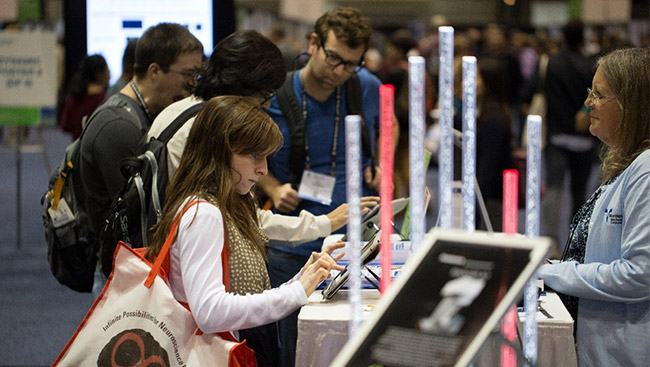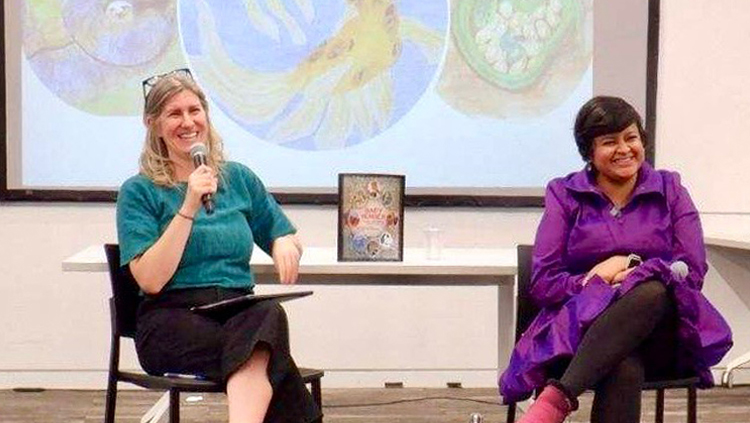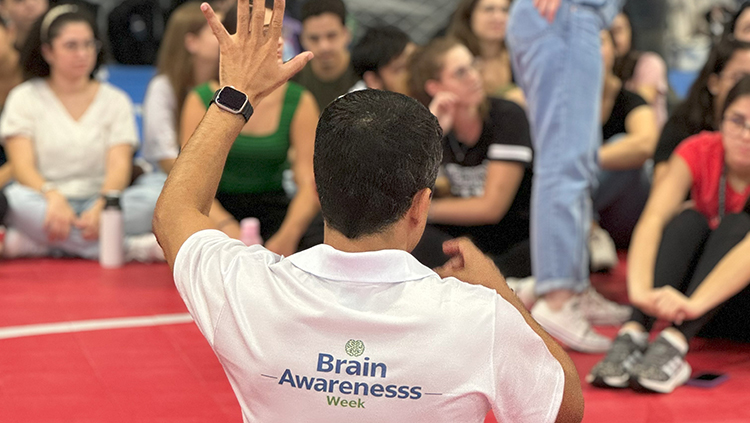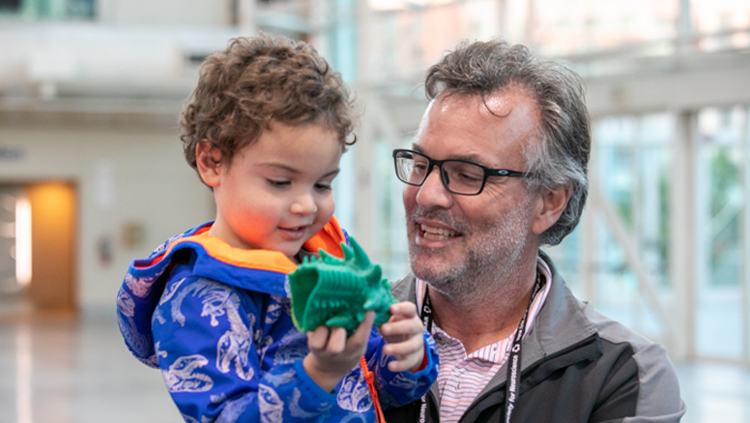A Postdoc on What He Gains From Doing Outreach
- Featured in:
- Training for Diverse Career Paths
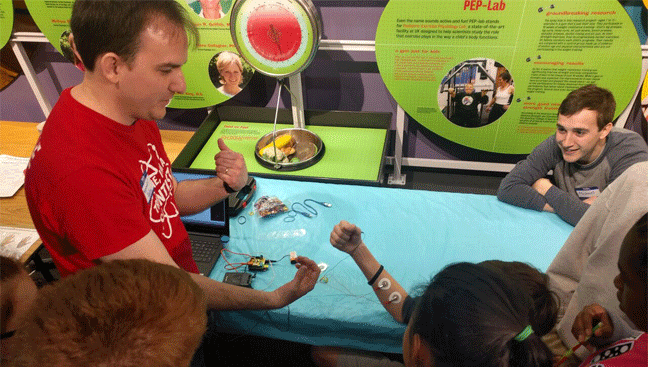
From volunteering at local science outreach events to serving on local and national committees, Andrew Bankston, a postdoc at the University of Louisville, has become closely involved in his community to spread awareness and excitement about the brain and basic research. Here, he reflects on how his outreach experiences have advanced his career and how he balances outreach with lab work.
What types of volunteer outreach activities are you involved in?
At the University of Louisville, I serve on a board that convenes quarterly with the associate dean for graduate students, higher level administrators, faculty, and postdocs. We discuss administrative issues related to postdocs at the university and make recommendations or decisions for policies affecting postdocs. I also help organize a career seminar series to provide students and postdocs with information about potential career options with a PhD.
Locally, I mentor middle and high school students, judge science fairs, and volunteer at the Kentucky Science Center. I help organize outreach events with our local SfN Louisville chapter, such as this year’s Brain Awareness Week Brain Days at the Kentucky Science Center. I also organize community engagement activities with the Kentucky Academy of Sciences.
Because my research is related to Multiple Sclerosis, I got involved with the local chapter of the National Multiple Sclerosis Society. Mostly I run around doing whatever needs to be done. As soon as they learned that I was a scientist, I became a source on the latest research and answer questions for the chapter and Multiple Sclerosis patients (though I never make medical recommendations).
Nationally, I’m now on the National Postdoctoral Association’s (NPA) Board of Directors. Previously, I served as the NPA Outreach Committee Chair, helping to keep the NPA connected with the community and raise awareness about the NPA and its resources.
What motivates you to get involved with the community?
Talking to different people and getting them excited about science energizes me. I've always enjoyed teaching and training people. Doing these activities is fun.
Interacting with patients through the Multiple Sclerosis Society is also meaningful to me. I enjoy explaining the connection of the disease to basic science research to make what can seem like a big, abstract topic more personal. I try to emphasize the importance of basic research to understand the disease. It's nice to have this community where we all care about that same problem but approach it in different ways. It also lets people know that real scientists — who they can talk to — live in their community.
There are also career-related reasons. Because I put so much time into volunteering, I make sure that everything I choose to participate in will advance some skill or goal for my career.
In what specific ways have you improved your skills through outreach and volunteer leadership experiences?
Overall, these outreach activities have improved my project management skills, and, as a result, I have learned how to effectively budget my time.
Interacting with various audiences has also made me a better communicator and actually improved my work presentations. I’ve found that explaining scientific research for lay audiences forces you to test your understanding of your own research and other areas of science.
I also sharpened my social media skills when I was the NPA Outreach Chair, which I wouldn't have done otherwise. Managing social media surprisingly led me to connect and build relationships with other neuroscientists.
How do you make time for all of these activities, and how do you convince your PI that they are worth your time?
My PI is pretty supportive. While I think he's a little wary of it, like any PI or boss would be, he is okay with my outreach work as long as my lab productivity is good.
I try to limit the time spent on these activities during work hours, and, as much as I can, I focus my volunteering activities on nights and weekends. However, if I have tasks for both lab and for one of my volunteer activities, I'll give priority to the lab task. I have to do the job for which I'm paid before I can do freebie activities. I treat volunteering as a hobby that may lead to future career benefits.
I therefore have to be efficient in lab. I plan my day so that I know what I’ll be doing and what I need to do it even before I get to the lab. That way I don't lose time trying to figure out what I should do each day.
How can others learn from your efforts to fit outreach activities in around lab work?
Know that you can't do everything. You have to be choosy about what you do — in the lab, too. You have to find that balance between maintaining a good productivity level in the lab and leaving time for outreach activities.
Then you have to be selective with the volunteer opportunities that you choose. I try to focus on what will essentially give me the most reward for the time that I put in.
And of course, keep a detailed calendar. If I didn't have that, I would have no idea exactly how much time I'm investing in volunteer activities.
What final advice would you give to people looking to get involved with outreach and volunteering?
Start small. Let somebody else organize the event and then show up to assist. When you see a call for volunteers, consider joining. If you're the type of person that will take initiative when you see a need, that’s great. But, you don't always have to be the organizer.
Other easy activities to start with are judging science fairs, mentoring kids, or doing science demonstrations at school visits. Sometimes the middle and high school students understand the topics better than you do, and sometimes the conversation can wind up a little beyond their level. It's a skill to recognize the gap in expertise and manage that conversation flow so everyone understands each other.
Overall, just get involved in activities outside of the lab. There are a lot of students and postdocs that stay in the lab all the time and burn out. Nobody wants that. Participating in outreach activities is a good excuse for taking a break from the lab. But, it's easy to get swept up in the excitement of outreach, so don't forget that it's a balance.
Lastly, push beyond your comfort zone. Don't be afraid to try something different even if you’re unsure of how well you'll do. Growing is often uncomfortable, but it matures you. The key is to build a strategy that matures you in the right areas.
*Photo provided by interviewee. Explanation: "In this photo, taken at the March 2017 Brain Days event, we are demonstrating the Human-Human Interface device from Backyard Brains. It transduces signals received from the child’s arm on the right into stimulus signals directed into my ulnar nerve, causing my hand and wrist to curl. It shows that their arm receives signals from the brain. We can detect those signals, and through that device, convert those signals into a stimulating signal sent into my arm."
Speaker



